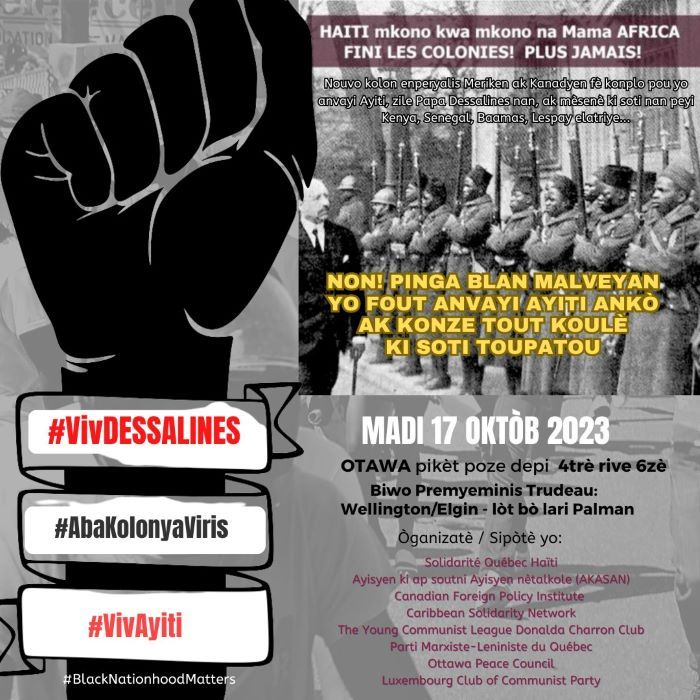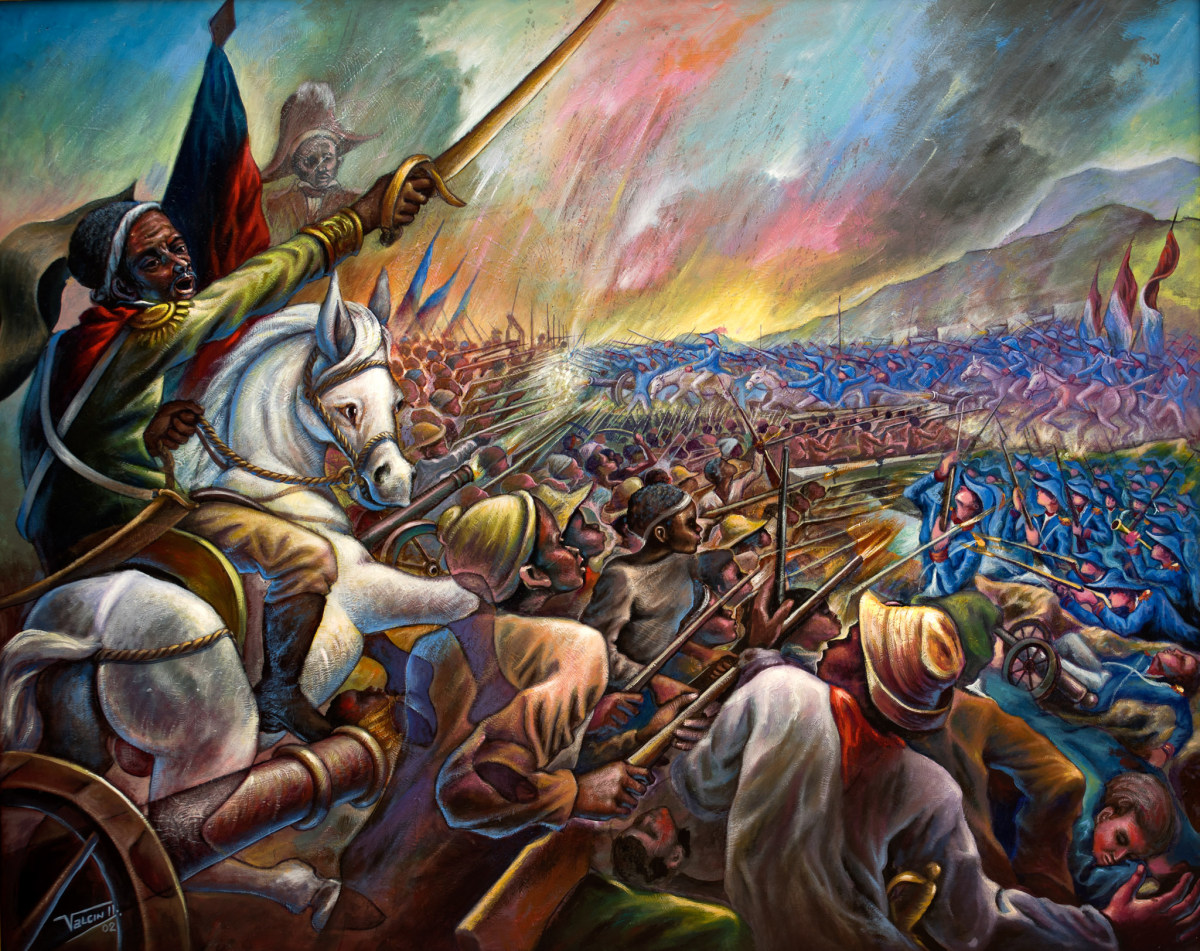No. 12
October 2023
Hands Off Haiti!
• Canada-CARICOM
Summit: No to Canadian Interference
in the
Caribbean!
• Canada Announces RCMP Mission in Haiti
• UN Security Council Authorizes Foreign Intervention in Haiti
Views
• Caribbean Organizations Denounce UN Security Council's Approval of Kenya-Led Mission to Haiti
• Haiti as Empire's Laboratory
For Your Information
• 217th Anniversary of Assassination of Jean-Jacques Dessalines: Founder of Haitian Nation
Hands Off Haiti!
Join Ottawa Demonstration to Say No to Canadian and CARICOM
Support for Foreign
Intervention in Haiti

Ottawa
Tuesday,
October 17, 2023 -- 4:00-6:00 pm
Parliament Hill
Facebook
October 17 is the 217th anniversary of the assassination in 1806 of Jean-Jacques Dessalines who proclaimed Haiti’s independence on January 1, 1804. Far from honouring the memory of this defender of freedom this is the day chosen to begin the first Canada-CARICOM Summit taking place in Ottawa from October 17 to 19. The aim of the summit is to shore up support for foreign intervention in Haiti. Solidarité Québec-Haiti and other organizations are holding a demonstration to oppose the UN Security Council’s decision to send Kenyan police to Haiti.
Since Haiti declared its independence, the French colonialists and U.S. imperialists have not stopped causing misery for Haiti and the Haitian people continue to fight for peace, freedom and democracy.
No to Military Intervention in Haiti!
Hands
off Haiti!
Organized by Solidarité Québec-Haiti and others organizations.
Canada-CARICOM Summit: No to Canadian Interference in the Caribbean!

Canada will host leaders of the Caribbean Community (CARICOM) for the first Canada-CARICOM Summit in Ottawa from October 17 to 19. Justin Trudeau will co-chair the Summit alongside the Prime Minister of Dominica, Roosevelt Skerrit, the current president of CARICOM. "Strategic partnerships for a resilient future" is the theme of this summit.
What's the context? Canada is holding this summit as part of the efforts, visits and travels of Canada and the United States in the Caribbean to coax the CARICOM countries, maintain their influence and retain control over Haiti in the service of the Group Core. To add insult to injury, it is being held on the day of the death of Jean-Jacques Dessalines, the hero of Haiti's independence in 1804, as an affront to the Haitian people. It's a double affront, because Canada will receive at the Summit Haiti's illegitimate and unelected Prime Minister Ariel Henry, who was imposed on the Haitian people by decision of the UN mission in Haiti and the U.S.-dominated Core Group.
On October 2, the UN Security Council adopted the U.S. resolution allowing Kenya to send troops to Haiti for one year starting in January. Barbados also announced that it would take part in the interference planned by the U.S. against Haiti. Eleven other countries had already indicated their intention to participate according to reports: Bahamas, Jamaica, Antigua and Barbuda, Suriname, Belize, Guatemala, Peru, Italy, Spain, Senegal and Mongolia.
The summit announces the theme of building partnerships for a resilient future. The word resilience is defined as "the ability of a person or group to develop well, to continue to project themselves into the future, in the presence of destabilizing events, difficult living conditions, sometimes severe trauma." This term seems intended to make it very clear and unequivocal that the undemocratic, destructive activities of Canada and the Group Core in Haiti will continue, despite the total opposition of the Haitian people to foreign interference and their sovereign will.
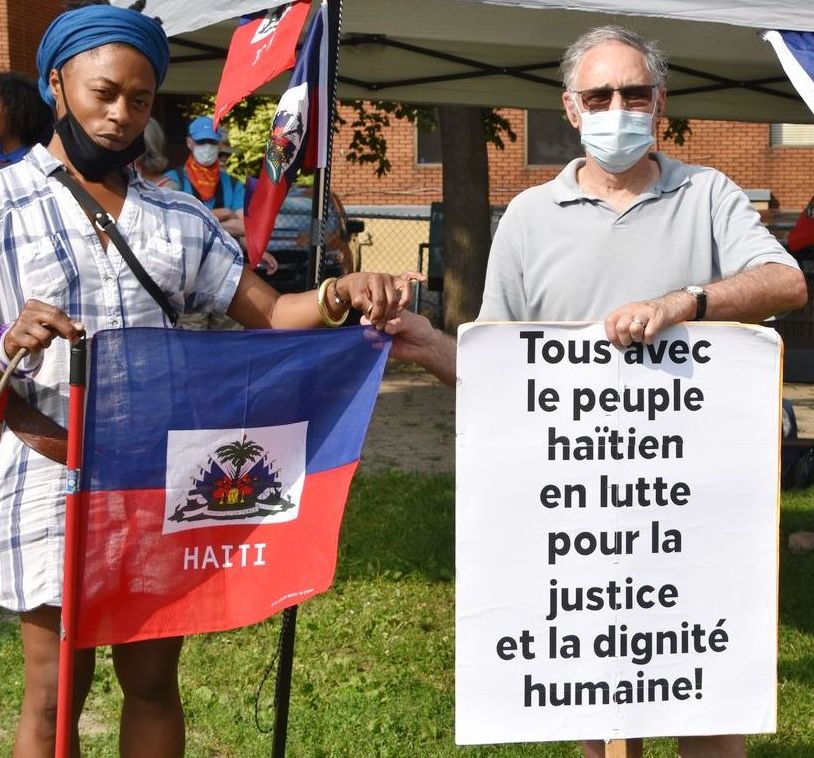 The press release
issued by the Prime Minister's Office (PMO) further
states: "During the Summit, Prime Minister Trudeau will highlight the
importance of strengthening democratic values, promoting human rights
and the rules-based international order, and improving coordination in
matters of regional
security, in particular by responding to the political, humanitarian
and security crisis currently plaguing Haiti." It was precisely under
the veneer of speeches about defending democracy, human rights and a
rules-based international order that Canada participated in the 2004
coup with the U.S. and
France against Haiti, and participates as a member of the Group Core in
Haiti. Its actions have nothing to do with these high ideals.
The press release
issued by the Prime Minister's Office (PMO) further
states: "During the Summit, Prime Minister Trudeau will highlight the
importance of strengthening democratic values, promoting human rights
and the rules-based international order, and improving coordination in
matters of regional
security, in particular by responding to the political, humanitarian
and security crisis currently plaguing Haiti." It was precisely under
the veneer of speeches about defending democracy, human rights and a
rules-based international order that Canada participated in the 2004
coup with the U.S. and
France against Haiti, and participates as a member of the Group Core in
Haiti. Its actions have nothing to do with these high ideals.
"Finally, the leaders will speak with Canadian business leaders and investors to create more business opportunities in the region," the press release says. Among other things, this part directly relates to the interests and large investments of Canadian mining companies and American interests in the region for the plunder of Haiti's resources, including rare earth and irradium deposits in Haiti and the Caribbean.
CARICOM is a regional organization that was established by the Treaty of Chaguaramas on July 4, 1973. It consists of 15 full members and five associate members. Full members are Antigua and Barbuda, Bahamas, Barbados, Belize, Dominica, Grenada, Guyana, Haiti, Jamaica, Montserrat, Saint Kitts and Nevis, Saint Lucia, Saint Vincent and the Grenadines, Suriname and Trinidad and Tobago. Associate members are the following overseas territories: Anguilla, Bermuda, British Virgin Islands, Cayman Islands and Turks and Caicos Islands.
Canada Announces RCMP Mission in Haiti
On October 5, two days after the UN Security Council authorized an interventionist force to enter Haiti, Global Affairs Canada announced plans to deploy RCMP officers to Haiti "to act as trainers in a multinational military intervention, with officials promising an added focus on preventing sexual violence," the Canadian Press (CP) reported.
"The RCMP are looking at being focused on technical training," said Lisa Vandehei, the head of an interdepartmental task force on Haiti at Global Affairs Canada. "Canada's training mission, the planning for it is still underway," she testified at the Standing Senate Committee on Foreign Affairs and International Trade on October 5.
"Vandehei said Canada is still assessing its contribution to the mission, adding that Kenya is prepared to launch a deployment within 90 days of its parliament ratifying the mission," CP said. That puts its deployment to January, all else being equal. Given that the languages spoken in Kenya are Swahili and English, members of the Kenyan police are now said to be learning French to prepare for their mission.
CP reports Vandehei saying the RCMP will likely train officers of the Haitian National Police on "very surgical, technical areas" through a model that would have each Canadian-trained officer go on to teach other Haitian peers.
"The RCMP are the best in the world in several areas of policing that the HNP need, in certain elements," Vandehei said.
Global Affairs Canada said in a statement that Ottawa is also "focused on preventing sexual and gender-based violence" in Haiti. CP reports that the statement noted "gangs have been using sexual violence as a means of controlling the population” and that Vandehei noted in her testimony that in past military interventions in Haiti, locals have reported widespread sexual exploitation by both fellow citizens and foreign armies. Given these reports it would seem that the "focus" is on hiding the sexual violence of foreign forces sent to Haiti.
"We are very much attuned to that, and especially when it comes to sexual and gender-based violence taking place already in Haiti," she said.
"We're looking at working with the Kenyans and the U.S. on how to bring our own lessons learned to the table from our [historical] work in Haiti as well."
"Vandehei said Canada's aim with the multinational mission is to ensure police have the training and equipment they need to maintain order in Haiti after foreign forces leave, and that the society has the institutions needed for a viable democracy," CP wrote. "We're going into this issue with open eyes, and it's why we're creating a multi-faceted solution," Vandehei said.
According to the CP report, Vandehei shed some light on recent Canadian efforts to shore up the Haitian National Police, including on a June announcement of the International Security Assistance Co-ordination Group, which has Canada managing how various countries support the HNP.
She said "Canada is co-ordinating contributions from 'over 26 countries,' such as where the equipment offered by foreign countries could be best used in Haiti, whether it responds to local needs and if it's interoperable with existing kit."
Similarly, "Canada is helping assemble a training calendar so that foreign police can fill the gaps that Haitian and Canadian officials have identified. She said part of the idea is pulling out cohorts for training in numbers that won't disrupt an already strained police force. Vandehei noted that there are roughly 9,000 police officers for a nation of more than 11 million people."
UN Security Council Authorizes Foreign Intervention in Haiti
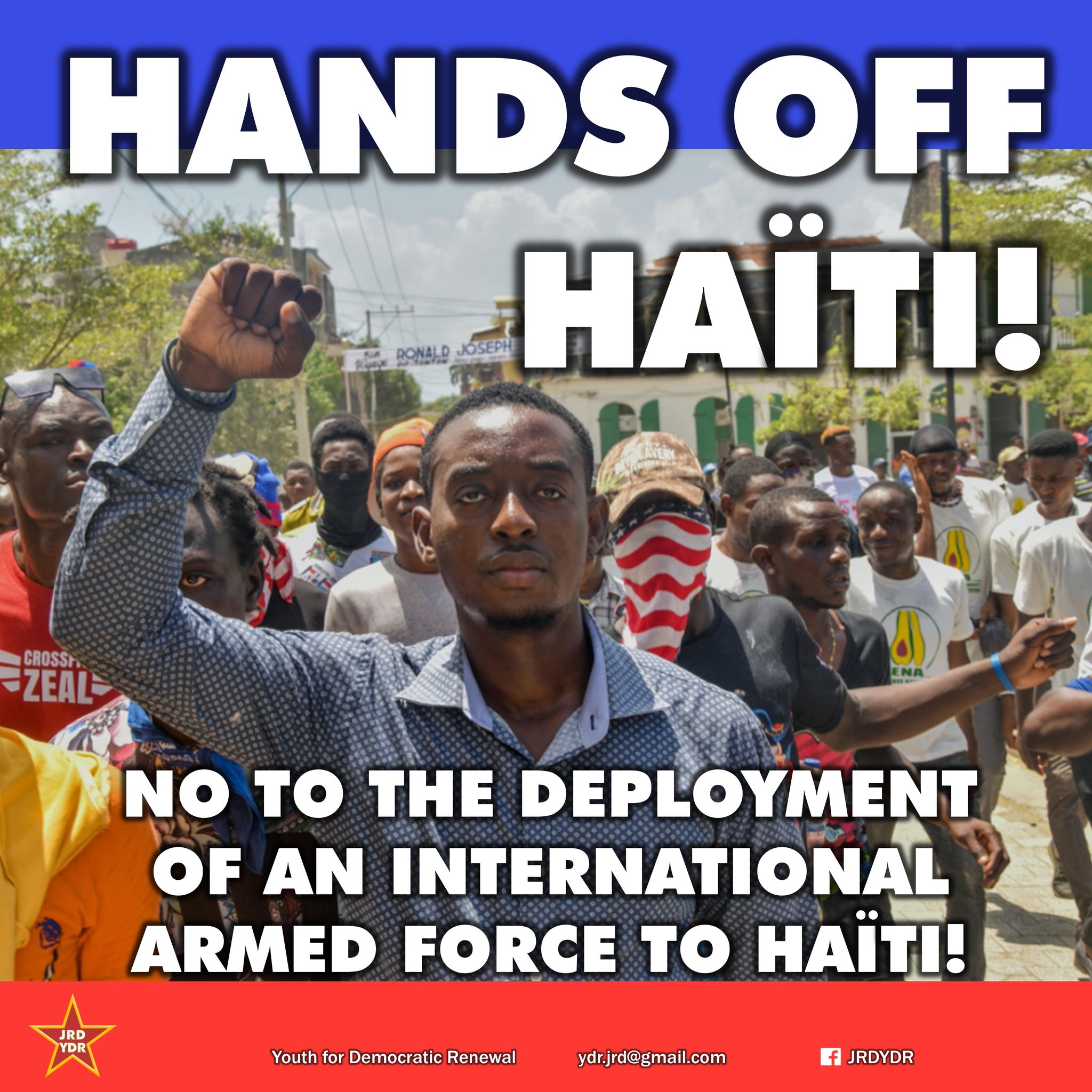 On October 2, the
United Nations Security Council (UNSC) adopted
resolution 2699 (2023), co-authored by Ecuador and the U.S., to
authorize a foreign intervention force in Haiti. The resolution was
adopted by a recorded vote of 13 in favour with two abstentions --
China and the Russian
Federation. The Security Council, "acting under Chapter 7 of the UN
Charter, authorized the Mission on the understanding that the cost of
implementing the operation will be borne by voluntary contributions and
support from individual Member States and regional organizations, in
strict compliance
with international law," the UN News Agency reports.
On October 2, the
United Nations Security Council (UNSC) adopted
resolution 2699 (2023), co-authored by Ecuador and the U.S., to
authorize a foreign intervention force in Haiti. The resolution was
adopted by a recorded vote of 13 in favour with two abstentions --
China and the Russian
Federation. The Security Council, "acting under Chapter 7 of the UN
Charter, authorized the Mission on the understanding that the cost of
implementing the operation will be borne by voluntary contributions and
support from individual Member States and regional organizations, in
strict compliance
with international law," the UN News Agency reports.
It has become apparent that approval came without clarification of an oversight mission. It leaves the establishment of such a mechanism to the mission itself, which is a recipe for impunity if ever there was one. "The Council called on the Mission to establish an oversight mechanism to prevent human rights violations or abuses, and to ensure that the planning and conduct of operations during deployment will be in accordance with applicable international law," the UN report says.
The United States is overjoyed that it finally managed to give this intervention force a legal veneer. The mission is designed to protect the narrow private interests the U.S. serves which are considerable in Haiti. It also increases the militarization of the Caribbean which is a strategic interest of NATO as well in which Ecuador is playing a considerable role by permitting its coasts to be used for war exercises.
The U.S. representative on the UNSC, Jeffrey Delaurentis, said the council "made history in authorizing the Multinational Security Support Mission in Haiti." What he meant by calling the resolution "history-making," is yet to be revealed. U.S. Ambassador to the UN Linda Thomas-Greenfield also referred to it as "an historic resolution."
Vassily Nebenzia, the Russia Federation's Permanent Representative to the UN explained the abstention of the Russian Federation as follows: "We are fully aware of the scale and urgency of Haiti's outstanding security challenges. [...] we must realize that deploying a country's armed forces on another country's territory (even if upon a request), is an extreme measure that requires thorough elaboration. However when configuring the mission and preparing a corresponding UNSC draft resolution, we found ourselves in a situation where our justified requests for details on the concept of this operation, modalities of the use of force, and contingent withdrawal strategies were left unanswered. Besides, we received an impression that this non-UN mission was going to obtain UN-grade legitimacy via an undercooked and insufficiently considered decision of the Council.
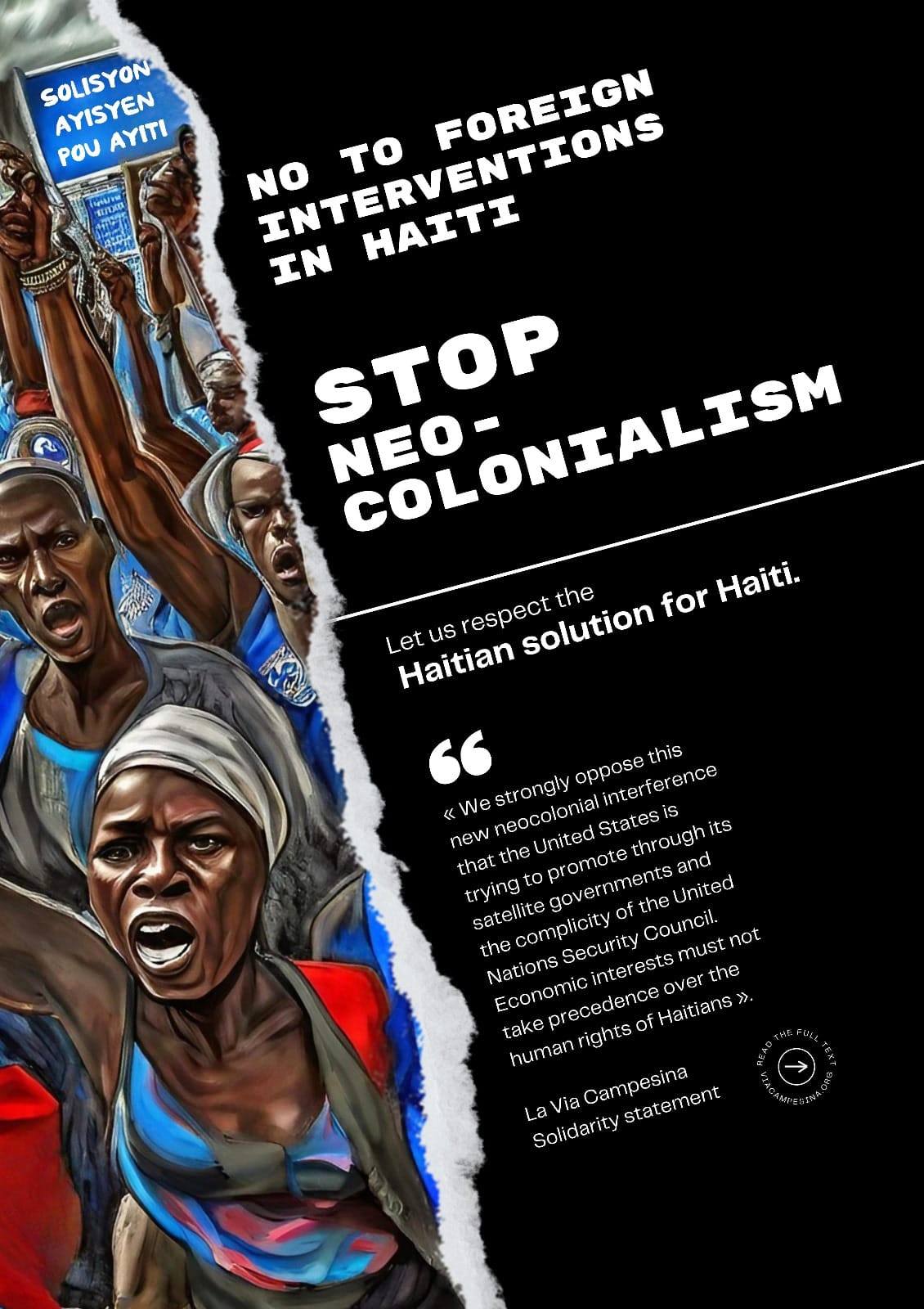 "We
all understand that authorization of a force operation under Chapter 7
is a serious step that requires full knowledge of related
responsibility and possible consequences. Unfortunately, during the
work on the document, we were not sure this was the case. [...] Russia
cannot agree to invoking
Chapter 7 almost blindly.
"We
all understand that authorization of a force operation under Chapter 7
is a serious step that requires full knowledge of related
responsibility and possible consequences. Unfortunately, during the
work on the document, we were not sure this was the case. [...] Russia
cannot agree to invoking
Chapter 7 almost blindly.
"The history of Haiti has sufficient experience of irresponsible foreign interference, which is exactly what kicked off a spiral of degradation which the people of Haiti have been unable to overcome for years. For us to authorize another use of force in Haiti without being fully cognizant of the parameters of the mission is an improvident thing to do. Besides, concept of the operation should be submitted to the Council for endorsement rather than to be studied as a fait accompli."
Given all of this, a legitimate question would seem to be why then Russia did not exercise its veto?
Brian Wallace, Ambassador and Permanent Representative of Jamaica to the United Nations endorsed the resolution on behalf of the Caribbean Community (CARICOM) saying the "urgency of this moment cannot be overstated." He cited insecurity and a desperate need for humanitarian aid, as the rationale for support saying, "This is the backdrop against which we are called to act to help restore security and contribute to a stable political, social and economic environment to foster Haiti's sustainable development."
Without taking a stand on why, after years and years of UN and foreign aid, a stable political, social and economic environment has eluded Haiti, his stand cannot be respected. To suggest as did Wallace that this foreign intervention is the first step to bring about "Haitian-led and Haitian-owned" solutions is unacceptable rhetoric given the plight into which the Haitian people have been plunged since the coup organized by the U.S., Canada and France in 2004. "CARICOM therefore welcomes and reiterates its support for a Multinational Security Support Mission authorized by a United Nations Security Council Chapter 7 resolution, to provide urgent security assistance to the Haitian National Police," Wallace concluded.
Regarding Canada's position, the Canadian Press (CP) reported that on October 3, Foreign Affairs Minister Mélanie Joly informed the press that "Canada is determining how it can best help with an international military intervention in Haiti, leaving it unclear whether this will involve a military role for Canada." CP added:
 "Joly
says she's spoken with her counterpart from Kenya as well as Canada's
ambassador to the United Nations, Bob Rae, on how Canada can be of help.
"Joly
says she's spoken with her counterpart from Kenya as well as Canada's
ambassador to the United Nations, Bob Rae, on how Canada can be of help.
"Joly notes that Ottawa has always been involved in issues pertaining to Haiti, and says she expects Canada will do more, but isn't specifying what kind of Canadian help has been offered."
"Canada has always been involved in issues related to Haiti. We will continue to be," Joly told reporters."We want to do more. So we'll thus continue these diplomatic conversations, and I would say that we'll also continue to support solutions that are by and for Haitians," she added.
CP says that in response to the U.S. request for Canada to lead the interventionist force into Haiti, "Canada's top military general told media in March that there weren't enough armed forces available to lead such a mission."
The Black Alliance for Peace issued a statement [see below] on October 3 denouncing the UN Security Council's approval to send a Kenya-led mission to Haiti. The statement was signed by more than 70 organizations internationally.
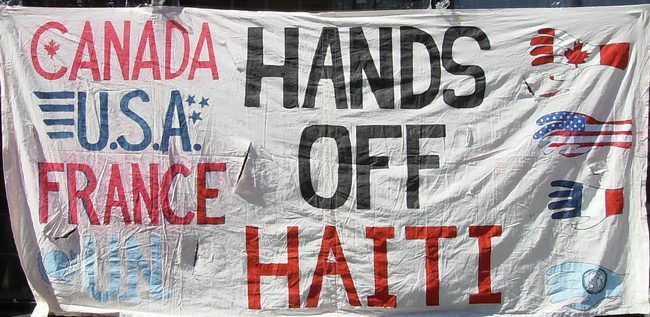 The
Kenyan force to lead this mission is internationally known for
extrajudicial killings and forced disappearances committed with
impunity. The U.S. State Department itself wrote in February 2023 in
its "Kenya 2022 Human Rights" report that "Between July 2021 and June
30, the Independent
Policing Oversight Authority (IPOA) received 180 complaints regarding
deaths resulting from police actions. [...] Police and prison officials
reportedly used torture and violence during interrogations as well as
to punish pretrial detainees and convicted prisoners. According to
human rights NGOs,
physical battery, bondage in painful positions, and electric shock were
the most common methods used by police."
The
Kenyan force to lead this mission is internationally known for
extrajudicial killings and forced disappearances committed with
impunity. The U.S. State Department itself wrote in February 2023 in
its "Kenya 2022 Human Rights" report that "Between July 2021 and June
30, the Independent
Policing Oversight Authority (IPOA) received 180 complaints regarding
deaths resulting from police actions. [...] Police and prison officials
reportedly used torture and violence during interrogations as well as
to punish pretrial detainees and convicted prisoners. According to
human rights NGOs,
physical battery, bondage in painful positions, and electric shock were
the most common methods used by police."
The U.S. State Department reported that "Missing Voices website, founded by a group of non-governmental organizations (NGOs) to track police killings and disappearances, documented 90 cases of police killings and three suspected enforced disappearances during the year. The Independent Medico-Legal Unit (IMLU) documented 37 cases of extrajudicial killings between January and June. ... In April, the Missing Voices Coalition released its annual report on extrajudicial killings and enforced disappearances in the country. The report documented 30 police killings linked to the Pangani Police Station in Nairobi in 2021.... IMLU reported 109 cases of torture between January and September, as compared with 78 cases during the same period in 2021."
The Communist Party of Canada (Marxist-Leninist) reiterates the demand of the people of Haiti against the deployment of this foreign intervention force. It is the foreign intervention in Haiti's affairs which props up the most corrupt and brutal regimes, using the most corrupt and brutal methods to achieve this.
Process to Draft Haiti Resolution
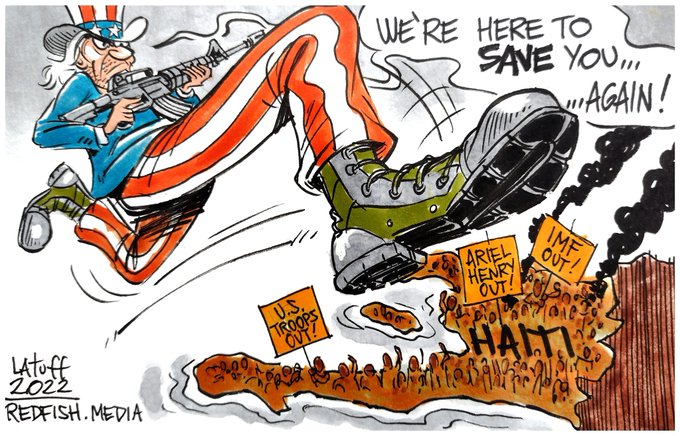 On
September 22, the U.S. hosted a ministerial-level event on the
sidelines of the UN General Assembly to discuss the proposed
multinational force. At the meeting, U.S. Secretary of State Antony
Blinken pledged $100 million to support the deployment –
pending
Congressional approval –
as well as logistical support in the form of intelligence, airlift,
communications, and medical capabilities. Several other countries in
attendance reportedly also announced pledges of support.
On
September 22, the U.S. hosted a ministerial-level event on the
sidelines of the UN General Assembly to discuss the proposed
multinational force. At the meeting, U.S. Secretary of State Antony
Blinken pledged $100 million to support the deployment –
pending
Congressional approval –
as well as logistical support in the form of intelligence, airlift,
communications, and medical capabilities. Several other countries in
attendance reportedly also announced pledges of support.
The website Security Council Report informs that UNSC negotiations on the draft resolution lasted one month. The co-drafters circulated an initial draft of the resolution to council members on September 1 and convened the first round of negotiations on September 5. The co-drafters then circulated a revised draft on September and convened another round of negotiations on September 7. A second revised draft was circulated on September 8, followed by a third round of negotiations on September 9. On September 14, the co-drafters circulated a third revised draft, after which negotiations were paused for the opening session of the UN General Assembly. Council members reconvened for a fourth round of negotiations on September 25.
On September 26, the co-drafters circulated a fourth revised draft that they placed under silence procedure -- a period of deliberation of at least 72 hours whereby the resolution is posted on the UN's official document system and a deadline is given for a response. Silence is broken when a country raises an objection. In this case, the silence was broken by China. On September 27, the co-drafters circulated a fifth revised draft, placing it under another silence procedure, which China broke again. On September 29, the co-drafters circulated a sixth revised draft that they put in blue -- this refers to the final stage of negotiating a draft resolution when the text is printed in blue. China subsequently proposed additional edits to the draft, which was then further revised and finalized for a vote on October 2.
Security Council reports, "It seems that in the final draft resolution in blue, the council, acting under Chapter VII of the UN Charter, authorizes member states to form and deploy a Multinational Security Support (MSS) mission to support the efforts of the HNP to re-establish security in Haiti and to build security conditions conducive to holding free and fair elections. The draft resolution authorizes the mission for an initial period of 12 months, which is to be reviewed nine months after the adoption of the resolution, and requires participating countries to notify the Secretary-General of their intention. It specifies that the cost of implementing the operation will be borne by voluntary contributions and support from individual countries and regional organizations.
"The draft resolution apparently gives the MSS mission a two-fold mandate. One function is to provide operational support to the HNP to counter gangs, including by building its capacity through the planning and conduct of joint security support operations. The second is to support the HNP in the protection of critical infrastructure sites, such as airports, ports, schools, hospitals, and key intersections.
"The draft requests the MSS mission leadership, in coordination with Haiti and other participating countries, to provide the Council with a concept of operations prior to deployment, including information such as the sequencing of deployment, mission goals, rules of engagement, exit strategy, number of personnel, and financial needs.
"It seems that the draft resolution authorizes the mission to take all necessary measures to fulfil its mandate but emphasizes that all measures must adhere to international law, including international human rights law. It calls on the mission to establish an oversight mechanism to prevent human rights violations, in particular sexual exploitation and abuse (SEA), and directs the mission to take necessary action to prevent and investigate such incidents, specifying a number of measures it must take in this regard, including vetting and training of personnel and the provision of safe and accessible complaint mechanisms. The draft resolution also stresses that any logistical support that the UN provides to the mission must abide by the UN Human Rights Due Diligence Policy.
"Additionally, it seems that the draft resolution in blue expands the arms embargo imposed by resolution 2653 of 21 October 2022, which established a sanctions regime on Haiti. While resolution 2653 called on countries to take necessary action to prevent the supply of arms to individuals and entities designated by the sanctions regime, the draft resolution in blue apparently expands the arms embargo to Haiti as a whole, with exceptions for the UN-authorized mission and Haitian security units working to promote peace and stability in the country. The 2653 Sanctions Committee may also grant exceptions on a case-by-case basis. (Currently, the sanctions regime only designates one individual, Jimmy Cherizier, also known as "Barbeque," who heads an alliance of Haitian gangs called the "G9 Family and Allies.")
"It seems that Council negotiations on the draft resolution were difficult. One major issue was the timing and type of authorization the Council was to provide. China's initial position was apparently that negotiations on the issue were premature, as the Council should not authorize the mission until it had received additional information from Haiti and Kenya on their bilateral agreement regulating the deployment, including details such as its rules of engagement, areas of deployment, resourcing, and exit strategy. China also argued that the Council should be cautious about invoking its authority under Chapter VII of the UN Charter -- which concerns enforcement measures -- and that the Council does not necessarily need to authorize a bilaterally agreed deployment. Instead, it may consider other options such as welcoming or endorsing it.
"To address China's concerns, it seems that Council members requested Kenya and Haiti to submit information to the Council outlining their bilateral agreement and the operational details of the deployment. Those details were reportedly not provided, however, as the countries had not yet advanced to that stage of the planning process. Kenya apparently maintained that the deployment's operational details should be agreed by all participating countries – not only bilaterally between Haiti and Kenya -- and that it could not complete its own domestic assessment and approval process required to finalize these details until the Council had authorized the deployment. For this reason, Kenya and some Council members held the view that a Chapter VII authorization was necessary and that a product retrospectively welcoming or endorsing the multinational force would not be sufficient.
"In an apparent compromise, the draft resolution in blue authorizes the MSS mission under Chapter VII but requires the mission to submit a concept of operations prior to deployment. It also requires participating countries to inform the Secretary-General of their intent. Additionally, the draft requests the mission to include information on its exit strategy in its regular reporting to the Council.
"It seems that another challenging issue concerned the illicit flow of weapons into Haiti. China apparently proposed additional language strengthening the arms embargo under the 2653 Haiti sanctions regime, as well as mandating the mission to support the HNP's efforts to combat illicit trafficking of arms and enhance border security. The expansion of the arms embargo proved contentious and was apparently not contained in the draft resolution that was initially put in blue. Following further engagement from China, however, the draft was further revised to reflect this proposal."
Views
Caribbean Organizations Denounce UN Security Council's Approval of Kenya-Led Mission to Haiti

We, the undersigned, strongly condemn the decision by the United States and its allies to deploy a foreign military force to Haiti. We are adamant that a U.S./UN-led armed foreign intervention in Haiti is not only illegitimate, but illegal. And we support Haitian people and civil society organizations who have been consistent in their opposition to foreign armed military intervention -- and who have argued that the problems of Haiti are a direct result of the persistent and long-term meddling of the United States, the United Nations, and the Core Group.
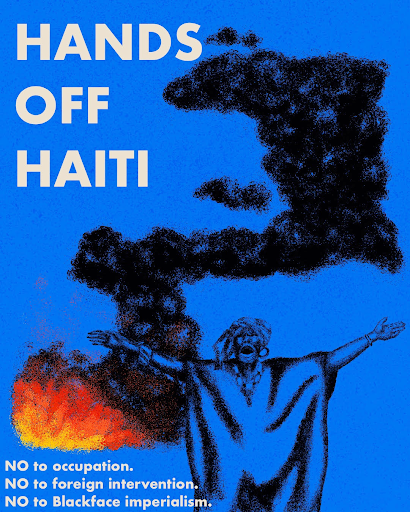 On
Monday, October 2nd, 2023, the United Nations Security Council (UNSC)
voted on a resolution for a Multinational Security Support Mission
authorizing the deployment of a foreign military and police
intervention into the Republic of Haiti. Although the vote did not
receive unanimous approval as
it saw abstentions from two permanent UNSC members, 13 other permanent
and non-permanent members voted in support, including 3 African
countries (Gabon, Ghana and Mozambique). This is a particularly
egregious betrayal of Haiti, which has been for Africans and Black
people around the world, a beacon
in the fight against slavery, colonialism and imperialism. Yet the U.S.
administration, the corporate media, alongside figures such as Linda
Thomas-Greenfield, have hailed the vote as a victory. We note, also,
that the U.S. has tapped Kenya, another African country, to lead a
multinational force of
"volunteer" nations to occupy Haiti, leaving their own troops at home
while offering at least $100 million in support.
On
Monday, October 2nd, 2023, the United Nations Security Council (UNSC)
voted on a resolution for a Multinational Security Support Mission
authorizing the deployment of a foreign military and police
intervention into the Republic of Haiti. Although the vote did not
receive unanimous approval as
it saw abstentions from two permanent UNSC members, 13 other permanent
and non-permanent members voted in support, including 3 African
countries (Gabon, Ghana and Mozambique). This is a particularly
egregious betrayal of Haiti, which has been for Africans and Black
people around the world, a beacon
in the fight against slavery, colonialism and imperialism. Yet the U.S.
administration, the corporate media, alongside figures such as Linda
Thomas-Greenfield, have hailed the vote as a victory. We note, also,
that the U.S. has tapped Kenya, another African country, to lead a
multinational force of
"volunteer" nations to occupy Haiti, leaving their own troops at home
while offering at least $100 million in support.
There is a long history here. For more than two years now, the U.S. has been pushing for a build-up of the military presence in Haiti to protect the puppet government of the unelected and unpopular Ariel Henry. Yet the U.S. is not willing to put its own boots on the ground, turning instead, first to Canada, then Brazil, then the CELAC and CARICOM countries -- all of whom were reluctant to lead the mission, even if they supported the call for military intervention. The Kenyan government leapt at the opportunity to lead the intervention, bought off by a bag of silver and an approving pat on their neoliberal heads. Haiti will now be invaded by the U.S., but with the Black face of Kenya as cover. Kenya erroneously claims this is "Pan-Africanism;" it is, in fact, neocolonialism.
 We
are told that the interest of the U.S. in Haiti is humanitarian, that
the U.S wants to protect the Haitian people from "criminal gangs." Yet
U.S. weapons have flooded Haiti, and the U.S. has consistently rejected
calls to effectively enforce the UNSC resolution for an arms embargo
against the
Haitian and U.S. elite who import guns into the country. Moreover, when
we speak of "gangs," we must recognize that the most powerful gangs in
the country are subsidiaries of the U.S. itself: the United Nations
Integrated Office (BINUH) and the Core Group, the two colonial entities
who have
effectively ruled the country since the U.S./France/Canada-backed coup
d'etat of 2004. Haiti has no sovereignty and has long been under
foreign occupation. The current de facto "Prime Minister" was installed
by the Core Group and whatever calls for military intervention are
being made by those
already occupying Haiti.
We
are told that the interest of the U.S. in Haiti is humanitarian, that
the U.S wants to protect the Haitian people from "criminal gangs." Yet
U.S. weapons have flooded Haiti, and the U.S. has consistently rejected
calls to effectively enforce the UNSC resolution for an arms embargo
against the
Haitian and U.S. elite who import guns into the country. Moreover, when
we speak of "gangs," we must recognize that the most powerful gangs in
the country are subsidiaries of the U.S. itself: the United Nations
Integrated Office (BINUH) and the Core Group, the two colonial entities
who have
effectively ruled the country since the U.S./France/Canada-backed coup
d'etat of 2004. Haiti has no sovereignty and has long been under
foreign occupation. The current de facto "Prime Minister" was installed
by the Core Group and whatever calls for military intervention are
being made by those
already occupying Haiti.
We hold in contempt the neocolonial governments that are taking part in this mission to further oppress Haitian people and deny them sovereignty. We denounce the governments of Kenya and the CARICOM nations, such as Bahamas, Jamaica, and Antigua and Barbuda, which have failed Haiti and have violated the notion of the Caribbean as a Zone of Peace.
Furthermore, we demand that:
- The U.S. and the UN must end their interference in Haiti and the Core Group must be disbanded.
- The U.S. must stop its criminal gangster actions against Haiti and stop propping up the illegitimate government they installed.
- Kenya must end its support for a racist and imperialist intervention in Haiti
- The governments of the U.S. and the Dominican Republic stop dumping arms and ammunition into the country and for the de facto Prime Minister to stop arming paramilitaries in the country.
- The United Nations pay restitution for the devastating 2010 cholera outbreak by rebuilding Haiti's water, sanitation, health, and educational infrastructure.
- That fuel subsidies for Haiti are reinstated and the minimum wage increased.
- The CARICOM countries, alongside other regional nations, normalize pathways for work visas and citizenship for Haitian nationals.
We vow to stand on the side of the Haitian people against imperialism!
To view the list of the signatories, click here.
Troops Out of Haiti
Just a few hours ago [on October 2] the United Nations Security Council "authorized" the deployment of "a multinational armed force" in Haiti, euphemisms that plainly and simply seek to hide the illegal occupation and violation of the right to self-determination of the Haitian people, and seek to present foreign interventionism as "diplomatic aid."
As if sovereignty were a matter of votes, the UN once again bypasses the rights of the Haitian people. ALBA Movements strongly rejects this new attempt at interference led by the United States, Kenya, and other countries that shamelessly deprive the right to decide from a people that has been demanding respect for its territory and its sovereign decisions for decades.
For a Haiti that is dignified, sovereign, and free from occupation!
(Resumen Latinoamericano, October 2, 2023. Translated from original Spanish by TML.)
CARICOM Deepens Its Betrayal
On 2 October, the U.S. presented to the United Nations Security Council a resolution calling for the authorization of its long planned military attack on Haiti. The resolution was adopted by 13 votes to 0 with Russia and China abstaining. The states which voted in favour of the resolution were Albania, Brazil, Ecuador, France, Gabon, Ghana, Japan, Malta, Mozambique, Switzerland, United Arab Emirates, United Kingdom and the United States.
Resolution 2699 that authorizes the military attack on Haiti has been passed under Chapter 7 of the United Nations Charter which allows for the use of violence against an individual state. A number of commentators have pointed out that, in fact, this resolution is illegal and itself violates the UN Charter since Chapter 7 focuses on defending international peace through addressing threats to the peace, breaches of the peace, and acts of aggression. Clearly, the activities of criminal gangs in an individual state do not present a threat to international peace and so are not the business of the UN Security Council and definitely not an issue that can be addressed by the use of Chapter 7. Not surprisingly, the drafters of the resolution do not explain how the situation in Haiti presents a threat to international peace. It is ironic that this resolution is being used to facilitate an act of unprovoked aggression against a member state, something that Chapter 7 is supposed to deter.
Given the recent demand from Biden to the UN General Assembly that the Security Council should immediately pass the resolution authorizing the aggression against Haiti, it was not surprising that Jeffrey Delaurentis, the representative of the USA, hailed the council's decision as historic while acknowledging the intense U.S. effort to engineer this new invasion of Haiti with his words, "it took us one full year to get where we are now." The decision of China and the Russian Federation to abstain rather than veto the resolution recalls the passing of resolution 1973 on 17 March 2011. That resolution, proposed by France, Lebanon, and the United Kingdom, authorized the establishment of a no-fly zone over Libya and on that occasion both China and the Russian Federation abstained rather than veto it. That was the greenlight the U.S. and its allies were waiting for. NATO immediately unleashed what Fidel Castro famously described as a 'fascist attack' on Libya. The barbaric destruction of Libya at the hands of NATO has had calamitous effects on the lives of the Libyan people. NATO's aggression turned their country from being the most developed in Africa to a hell hole of insecurity and violence, where Black people were literally being sold as slaves and recent calamitous flooding has claimed thousands more lives as a result of the destruction of the country's infrastructure. It should be recalled that Resolution 1973 stated that the establishment of the no-fly zone was intended to 'protect civilians', while Susan Rice, then U.S. representative at the UN, hailed the passing of resolution 1973 with the following words, "the Council has responded to the Libyan peoples' cry for help. The Council's purpose was clear: to protect Libyan civilians."
A representative of CARICOM, of which Haiti is a member, also spoke at the UN Security Council Meeting. Jamaica's ambassador and permanent representative to the United Nations, Brian Wallace, was the person chosen for this task. Stressing that he was speaking on behalf of all 14 member states of CARICOM, he delivered a despicable speech hailing the planned U.S. invasion of Haiti. With his speech, he wrote in capital letters that CARICOM's betrayal of Haiti and her people was complete and unlimited. Gone was the earlier CARICOM talk of opposing a military invasion and of defending Haiti's sovereignty so that the Haitian people could chart a path for their own country. Instead Wallace mindlessly repeated all the talking points from the U.S. propaganda narratives even going so far as to argue that "the first step towards Haitian-led and Haitian-owned solutions to the multi-dimensional, multi-faceted crises facing the country" is a foreign invasion. Wallace represents an Andrew Holness-led Jamaica Labour Party government, elected by the votes of 21 per cent of Jamaica's registered voters, which has distinguished itself as being one of the most subservient in the region to the interests of the U.S. Holness was one of those Caribbean leaders who in 2019 made his way to Mar-a-Lago, Florida to meet with then president Donald Trump as part of the U.S. efforts to destabilise Venezuela. As such, the disgraceful statement from Ambassador Wallace is hardly surprising. Nevertheless, it is irrational for the Andrew Holness government, which has failed miserably to provide the people of Jamaica with security and to deal with the problem of criminal gangs in Jamaica, to think that his government can contribute in any way to solving such a problem in Haiti. The same can be said of all the region's governments, which are struggling with the problems of rising crime and criminal gangs and many of which have a far worse murder rate than Haiti.
Unlike Holness, there are those in CARICOM, like Mia Mottley's government in Barbados and Ralph Gonsalves' government in St Vincent and the Grenadines who present themselves as different. They sell themselves as progressives, Pan-Africanists, anti-imperialists and so on. CARICOM's unreserved betrayal of Haiti and her people and their collusion with it exposes their claims as completely fraudulent. They are in bed with Holness and the U.S. in this attack on Haiti. Many wonder if the recent CNN article on Mia Mottley being considered as a possible UN General Secretary in 2026 is her reward for throwing Haiti to the wolves.
The people of Haiti are a heroic and fighting people. They liberated themselves from enslavement and contributed significantly to the end of slavery in the Caribbean and Americas. In this struggle, they defeated the invasions of England and Napoleon's France. They will certainly know how to deal with this new U.S. organized invasion of their country, which follows in the footsteps of the previous ones.
All Out to Support Haiti and Her
People!
No to the U.S. Organized Invasion!
Hands
off Haiti!
(Caribbean Organisation for Peoples Empowerment, October 6, 2023)
Haiti as Empire's Laboratory
As the United States and its allies push renewed foreign intervention, the uses and abuses of the first Black republic as a testing ground of imperialism offer stark warnings. Haiti still struggles to be free.
In December 2019, President Donald Trump signed into law H.R.2116, also known as the Global Fragility Act (GFA). Although this act was developed by the conservative United States Institute of Peace, it was introduced to Congress by Democratic Representative Eliot L. Engel, then chair of the House Committee on Foreign Affairs, and cosponsored by a bipartisan group of representatives, including, significantly, Democrat Karen Bass. The GFA presents new strategies for deploying U.S. hard and soft power in a changing world. It focuses U.S. foreign policy on the idea that there are so-called "fragile states," countries prone to instability, extremism, conflict, and extreme poverty, which are presumably threats to U.S. security.
Though not explicitly stated, analysts argue that the GFA is intended to prevent unnecessary and increasingly ineffective U.S. military interventions abroad. The stated goal is for the United States to invest in "its ability to prevent and mitigate violent conflict" by funding projects that mandate "an interagency approach among the key players, including the United States Agency for International Development (USAID) and the Departments of State, Defense, and the Treasury" amid collaboration with "international allies and partners."
In April 2022, the Biden-Harris administration affirmed its commitment to the GFA by outlining a strategy for its implementation. As detailed in the strategy's prologue, the U.S. government's new foreign policy approach depends on "willing partners to address common challenges, [and] share costs." "Ultimately," the document continues, "no U.S. or international intervention will be successful without the buy-in and mutual ownership of trusted regional, national and local partners." The Biden administration has also stressed that the GFA will use the United Nations and "other multilateral organizations" to carry out its missions. The prologue outlines a 10-year plan for the GFA that, according to the U.S. Institute of Peace, will "allow for the integration and sequencing of U.S. diplomatic, development, and military-related efforts." Among five trial countries for GFA implementation, Haiti is the first target.
Hailed by development experts as "landmark" legislation and, as Foreign Policy reported, a "potential game-changer in the world of U.S. foreign aid," the act seems to offer a reset of U.S. foreign policy in ways that shift tactics while maintaining the objectives and strategies of U.S. global domination. The act and its prologue clearly articulate that the main goals are to advance "U.S. national security and interests" and to "manage rival powers," presumably Russia and China. In this sense, especially for governments and societies in the Western Hemisphere, the GFA can be seen as a revamping of the Monroe Doctrine, the 1823 U.S. foreign policy position that established the entire region as its recognized sphere of influence, shaping U.S. imperialism. The GFA deploys cunning language -- tackling the "drivers" of violence, promoting stability in "conflict-prone regions," supporting "locally-driven political solutions"-- that hides the legislation's real intent: to rebrand U.S. imperialism.
In their deliberations on the Global Fragilities Act, U.S. officials labeled Haiti as one of the world's most "fragile" states. Yet this supposed fragility has been caused by more than a century of U.S. interference and a consistent push to deny Haitian sovereignty. Throughout a long history and complex -- though blatant -- imperialism, Haiti has been and continues to be the main laboratory for U.S. imperial machinations in the region and throughout the world. It is no surprise, therefore, that Haiti is the first object in the United States' latest rearticulation of a policy for maintaining global hegemony.
In fact, a review of the actions of the United States and the so-called "international community" in Haiti from 2004 to the present demonstrates how Haiti has served as the testing ground -- the laboratory -- for much of what is encapsulated in the Global Fragilities Act. The GFA, in other words, is not so much a new policy as it is a formal expression of de facto U.S. policy toward Haiti and Haitian people over the past two decades. Without recognizing these uses and abuses of Haiti, the site of the longest and most brutal neocolonial experiment in the modern world, we cannot fully understand the workings of U.S. (and Western) hegemony. And if we cannot understand U.S. hegemony, then we cannot defeat it. And Haiti will never be free.
Sovereignty Again Denied
Since 2004, Haiti has been under renewed foreign occupation and lacks sovereignty. This is not hyperbole. Take, for example, a series of events and actions following the July 7, 2021 assassination of Haiti's arguably illegitimate but still sitting president, Jovenel Moïse. The day after the assassination, Helen La Lime, head of the United Nations Integrated Office in Haiti (BINUH), declared that interim prime minister Claude Joseph would lead the Haitian government until elections were scheduled. Because of Joseph's interim status, however, the line of succession was unclear. Days before his killing, Moïse had named neurosurgeon and political ally Ariel Henry as prime minister to replace Joseph, but he had not yet been sworn in.
A few days after Moïse's assassination, the Biden administration sent a delegation to Haiti to meet with both Joseph and Henry, as well as with Joseph Lambert, who had been chosen by Haiti's 10 remaining senators -- the only elected officials in the country at the time -- to stand in as president pending new elections. Despite these competing claims to power, Washington chose a side. The U.S. delegation sidelined Lambert, convinced Joseph and Henry to come to an agreement over Haiti's governance, and urged Joseph to stand down.
A week later, on July 17, BINUH and the Core Group -- an organization of mostly Western foreign powers dictating politics in Haiti -- issued a statement. They called for the formation of a "consensual and inclusive government," directing Henry, as the designated prime minister named by Moïse, "to continue the mission entrusted to him." Two days later, on July 19, Joseph announced he would step aside, allowing Henry to assume the mantle of prime minister on July 20. The "new" -- and completely unelected -- government and cabinet was composed mostly of members of the Haitian Tèt Kale Party (PHTK), the neo-Duvalierist political party of Moïse and his predecessor Michel Martelly. In the wake of the devastating 2010 earthquake, the PHTK, with Martelly at the helm, was put in place by the United States and other Western powers without the support of the Haitian masses.
After the U.S. Embassy, the Core Group, and the Organization of American States (OAS) released similar statements applauding the formation of a new "consensus" government, U.S. Secretary of State Antony Blinken affirmed support for the unelected leaders. "The United States welcomes efforts by Haiti's political leadership to come together in choosing an interim prime minister and a unity cabinet," he said in a statement. In effect, Haiti's true power brokers -- or what I have called the "white rulers of Haiti" -- determined the Haitian government's replacement through a press release.
Meanwhile, the international community's decision-making process completely left out Haiti's civil society organizations, which had been meeting since early 2021 to find a way to resolve the country's political crisis as Moïse, already ruling by decree, was poised to overstay his constitutional mandate. These groups adamantly rejected the foreign-imposed interim government and have criticized the international community's actions as blatantly colonial.
Who and what are the entities making decisions for Haiti and the Haitian people, and how did they claim such prominent roles in controlling Haitian politics? Haitians are not members of the BINUH, OAS, or Core Group. But also central is the question of the country's sovereignty -- or lack thereof. Haiti has been under foreign military and political control for almost 20 years. But this is not the first time, of course, that Haiti has been under occupation.
Legacies of Foreign Control and Occupation
In the summer of 1915, U.S. Marines landed in Port-au-Prince and initiated a 19-year period of military rule that sought to snuff the sovereignty of the modern world's first Black republic. During this first occupation, as I have written elsewhere with Peter James Hudson, "the U.S. rewrote the Haitian constitution and installed a puppet president [who signed treaties that turned over control of the Haitian state's finances to the U.S. government], imposed press censorship and martial law, and brought Jim Crow policies and forced labor to the island." In line with its racist view that Black people do not have the capacity for civilization or self-government, Washington rationalized that it was necessary to teach Haitians the arts of self-government -- a view that continues today.
But the most pronounced labor of the U.S. Marines was counterinsurgency. They waged a "pacification" campaign throughout the countryside to suppress a peasant uprising against the occupation, using aerial bombardment techniques for the first time. Dropping bombs from planes onto Haitian villages, the pacification campaigns left more than 15,000 dead and countless others maimed. Those who survived and continued to resist were tortured and forced into labor camps.
The United States finally left the country in 1934 after massive grassroots protests by the Haitian people. But one of the most consequential results was the establishment and training during the occupation of a local police force, the Gendarmerie d'Haïti. For years, this police force and its successors were used to terrorize the Haitian people, a legacy that continues today.
In the years after the 1915-1934 occupation, the United States continued to intervene politically and economically in Haitian affairs. The most notorious of these engagements was the U.S. support for the brutal dictatorship of Francois "Papa Doc" Duvalier and Jean-Claude "Baby Doc" Duvalier. In the first democratic elections after the fall of the Duvalier regime, the United States unsuccessfully tried to prevent the ascension of the popular candidate, Jean-Bertrand Aristide. However, nine months after his January 1991 election, Aristide was deposed in a CIA-bankrolled coup d'état. The coup was not consolidated, though, because of continuous resistance from the Haitian people. By 1994, U.S. president Bill Clinton's administration was forced to bring Aristide back to Haiti after three years in exile -- with more than 20,000 U.S. troops in tow. Aristide was now a hostage to U.S. neoliberal policy. The troops remained until 2000.
Haiti officially lost its nominal sovereignty again in late February 2004. The Western governments, as well as the powerful Haitian elite, never supported the Aristide government, presumably because of its "populist and anti-market economy" positions, as former U.S. ambassador Janet Sanderson later alluded in a leaked 2008 diplomatic cable calling for continued foreign intervention. Thus, when Aristide won a second term in the 2000 elections, just months after his Fanmi Lavalas party gained control of a majority of seats in the parliament, the U.S. and its Western partners worked to discredit the administration. The French ambassador to Haiti at the time, Thierry Burkhard, later admitted that France was concerned about Aristide demanding financial restitution for the immoral indemnity -- or what The New York Times has called "The Ransome" -- that Haiti was forced to pay for its independence.
The plans for the 2004 intervention and occupation were hatched the previous year at a meeting in Canada dubbed the "Ottawa Initiative on Haiti." Aristide had been back in power for two years. Canadian prime minister Jean Chrétien and his Liberal Party government organized a two-day conference from January 31 to February 1, 2003 at Meech Lake, a government resort near Ottawa, that brought together top officials from the United States, European Union, and OAS to decide the future of Haiti's governance. There were no representatives from Haiti in attendance. Canadian journalist Michel Vastel, who got wind of this secret meeting, reported that the discussion in Ottawa included the possible removal of Aristide with a potential Western-led trusteeship over Haiti.
On February 29, 2004, President Aristide was deposed, bundled onto a flight by U.S. Marines, and flown to the Central African Republic. Almost immediately, U.S. President George W. Bush sent 200 U.S. troops to Port-au-Prince to "help stabilize the country." By the evening of Aristide's expulsion, 2,000 U.S., French, and Canadian soldiers were on the ground.
In the meantime, at the behest of permanent members the United States and France, the United Nations Security Council (UNSC) unanimously passed a resolution that authorized "the immediate deployment of a Multinational Interim Force for a period of three months to help to secure and stabilize the capital, Port-au-Prince, and elsewhere in the country." In other words, the UN voted to send a "peacekeeping" mission to Haiti. Significantly, Resolution 1529 was passed under Chapter VII of the UN Charter, which, unlike a Chapter VI resolution, authorizes UN forces to take military action through land, air, and sea without requiring the consent of the parties in conflict. That is, the resolution empowered the multinational force to "take all necessary measures to fulfill its mandate."
The UN mission to Haiti raises four important points. First, Haiti was the only country not engulfed in civil war to receive a Chapter VII UN military deployment. There were certainly local protests during the passage of the resolution, but these were of Haitians demonstrating against the removal of their democratically elected president. The situation in Haiti, in other words, could not be considered a civil war, in the normal sense of the word, that merited a Chapter VII deployment (if such deployment can ever be merited). Rather, through the deployment, the same characters who initiated and consolidated the coup suppressed a people's protest.
Second, key players in backing and aiding Aristide's removal were also permanent members of the UNSC, the only body with the power to deploy a multinational "peacekeeping" mission. From the Ottawa Initiative, it was clear that the United States, France, and Canada had conspired to remove Aristide and destroy the Haitian state. Third, and relatedly, to justify the foreign intervention and subsequent occupation, the United States and France concocted a narrative that Aristide had abdicated the presidency. Indeed, UN security documents and resolutions about Haiti during this time, as well as Western media reports, pointed to Aristide's presumed "resignation" as the reason for the deployment of UN military forces.
On March 1, 2004, the morning after Aristide's ouster, Democracy Now! broadcasted a remarkable live program during which U.S. congresswoman and chairperson of the Congressional Black Caucus, Maxine Waters, called in to say that she had spoken to President Aristide. "He said that he was kidnapped," Waters reported. "He said that he was forced to leave Haiti that the American Embassy sent the diplomats and they ordered him to leave." In the weeks following, Aristide spoke to Democracy Now! about the kidnapping. "When you have militaries coming from abroad surrounding your house, taking control of the airport, surrounding the national palace, being in the streets, and [they] take you from your house to put you in the plane," he said, "it was using force to take an elected president out of his country."
Fourth, and perhaps most egregiously, the UNSC claimed that the so-called interim government set up in the wake of Aristide's ouster had asked for the stabilization force. But that government was illegitimate. In his 2012 book Paramilitarism and the Assault on Democracy in Haiti, Jeb Sprague recounts that in the early morning after the Aristides were escorted to the airport, the U.S. ambassador to Haiti, James Foley, picked up Haitian Supreme Court Justice Boniface Alexandre and took him to the "prime minister's office for consultations in preparation for his ascension to power." Haiti's prime minister, Yvon Neptune, later reported that he did not have a say -- nor did he participate, as dictated by Haitian law -- in the swearing-in of Haiti's U.S.-installed interim president. Alexandre's first act as interim president was, on the order of the U.S. ambassador, to submit an official request to the UNSC for multinational military forces to restore law and order. The UNSC immediately authorized the deployment.
Taken together, these realities demonstrate how the entire UN deployment and occupation -- based on a coup d'état sponsored by two permanent members of the UNSC, claims that the president had resigned, and the illegal swearing-in of an illegitimate head of state -- were fraudulent. At the same time, protests from the Haitian people were dismissed by Western governments and media as "gang violence" and the action of "bandits." Such characterizations not only tapped into age-old racist stereotypes of Haitians as always already violent, but also gave more pretext for the Chapter VII deployment. To add insult to injury, most of the UN resolutions referred to securing Haiti's "sovereignty," as if this sovereignty could coexist with foreign political control and military occupation.
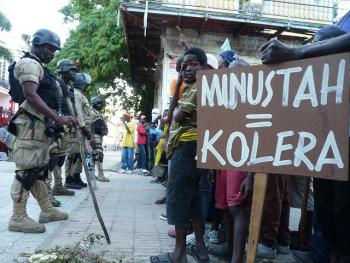 The illegal 2004
coup d'état was both perpetrated and cleaned up
with UN sanction. On June 1, 2004, the UN officially took over from
U.S. forces and set up the United Nations Stabilization Mission in
Haiti (MINUSTAH) under the guise of establishing peace and security. A
multibillion-dollar
operation, MINUSTAH had, at any given time, between 6,000 and 13,000
troops and police stationed in Haiti alongside thousands of
bureaucrats, technical staff, and civilian personnel. In a horrific
parallel to the first U.S. occupation of Haiti, MINUSTAH soldiers
committed numerous acts of violence
against the Haitian people, including shootings and rapes. MINUSTAH
soldiers were also responsible for bringing cholera into the country, a
disease that officially killed as many as 30,000 and infected almost a
million people.
The illegal 2004
coup d'état was both perpetrated and cleaned up
with UN sanction. On June 1, 2004, the UN officially took over from
U.S. forces and set up the United Nations Stabilization Mission in
Haiti (MINUSTAH) under the guise of establishing peace and security. A
multibillion-dollar
operation, MINUSTAH had, at any given time, between 6,000 and 13,000
troops and police stationed in Haiti alongside thousands of
bureaucrats, technical staff, and civilian personnel. In a horrific
parallel to the first U.S. occupation of Haiti, MINUSTAH soldiers
committed numerous acts of violence
against the Haitian people, including shootings and rapes. MINUSTAH
soldiers were also responsible for bringing cholera into the country, a
disease that officially killed as many as 30,000 and infected almost a
million people.
But what most solidified this occupation was the creation and operationalization of the Core Group. An international coalition of self-proclaimed and non-Black "friends" of Haiti, the Core Group was established as part of the 2004 UN resolution that brought foreign soldiers and technocrats to the country. While the group's membership has fluctuated since its initial formation, it currently has nine members: Brazil, Canada, France, Germany, Spain, the United States, European Union, OAS, and United Nations Organization. Significantly, the group has never had a Haitian representative. The Core Group's stated goal is to oversee Haiti's governance through the coordination of the various branches and elements of the United Nations mission in Haiti. But in practice, the Core Group represents an insidious example of (neo)colonialism driven by white supremacy.
Imperial Punishment
While there was a formal drawdown of the MINUSTAH mission in 2017, the UN has remained in Haiti through a set of new offices, culminating in the establishment of the United Nations Integrated Office in Haiti (BINUH) in 2019. Despite protests in Haiti against ongoing UN presence, the UNSC continues to renew BINUH's mandate each year. The latest renewal was on July 14, 2023. BINUH has had an outsized, public role in Haitian internal political affairs and is often the mouthpiece of the Core Group.
The overwhelming power of the Core Group is blatantly public. At a special session on Haiti at the UNSC on April 26, 2023, the newly appointed head of BINUH, María Isabel Salvador of Ecuador, took the lead in presenting Haiti in typical racist terms -- as a basket case of unthinking and violent gangs. Unelected and unaccountable to the Haitian people, the Core Group is the arbiter of colonial direct rule of Haiti.
Western imperialism in Haiti is a hierarchical structure established through the power of the United States, which then outsources colonial control of Haiti to others. In a confidential 2008 diplomatic cable released by Wikileaks, then U.S. ambassador Sanderson called MINUSTAH "a remarkable product and symbol of hemispheric cooperation in a country with little going for it." She continued: "There is no feasible substitute for this UN presence. It is a financial and regional security bargain for the [U.S. government] We must work to preserve MINUSTAH by continuing to partner with it at all levels That partnering will also help counter perceptions in Latin contributing countries that Haitians see their presence in Haiti as unwanted."
Brazil, for example, home to the largest Black population outside of Africa, oversaw the military wing of the occupation since its inception. The nominally leftist administration of President Luiz Inácio Lula da Silva spent more than $750 million to fund this operation. As I have written elsewhere, Haiti was Brazil's "imperial ground zero." But there was also buy-in from other marginalized governments from the Caribbean and Latin America. At one point, MINUSTAH's leadership included a representative from Trinidad and Tobago and an African American attorney and diplomat. And this leadership was accompanied by a multinational military force made up of troops from several South American, Caribbean, and African countries, including Argentina, Colombia, Grenada, Bolivia, Benin, Burkina Faso, Egypt, Cote d'Ivoire, Nigeria, Rwanda, Senegal, Cameroon, Niger, and Mali.
In addition to Brazil, other neighboring countries' neocolonial governments have been similarly recruited by the United States to aid in its undermining of Haitian sovereignty. The Dominican Republic, for instance, funded and housed the ragtag paramilitary troops that terrorized Haiti from 2000 to 2004. More recently, in the fall of 2022, Mexico joined the United States last year in advocating before the UNSC for renewed foreign military intervention in Haiti. Washington has urged Canada to take the lead, and in June 2023, Ottawa announced plans to coordinate international security assistance to Haiti, including police training, from the Dominican Republic.
Since Moïse's 2021 assassination, Haitians have protested foreign support for the illegitimate and corrupt de facto government, rising inflation and fuel prices, illegal weapons dumping, and a dizzying rise in violence. In response, the United States and its allies have continued to push for foreign military intervention in the country. In January 2023, the Community of Latin American and Caribbean States (CELAC) supported the call for a foreign force. In July, U.S. Secretary of State Blinken, Vice President Kamala Harris, and U.S. Representative Hakeem Jeffries convinced the Caribbean Community (CARICOM) to reverse its initial course affirming Haitian sovereignty to now call for intervention. At the time of writing, the United States was poised to introduce a UNSC resolution after Kenya expressed willingness to lead a multinational armed mission. It must be noted that it is Haiti's Core Group-installed Prime Minister Henry who, along with the UN office in Haiti, is insisting on this violent solution to the crisis in the country -- a crisis they themselves helped to create.
The Haitian community's continued protests against foreign troops and Western meddling are a testament to their unwavering courage.
The denial of Haitian sovereignty seems to be, as Sprague has described, "a synchronized effort by cooperating states and institutions bolstered by a global elite's consensus against popular democracy." The Global Fragilities Act, then, not only lays out a plan that has already been implemented in Haiti over the last 20 years, but also directly emerges out of U.S. experiences in the Haitian (neo)colonial laboratory. We need to recognize Haiti's critical place as a testing ground for U.S. and Western imperialism.
But Haiti is also the site of one of the longest struggles in the world for both Black liberation and anticolonial independence. This explains the U.S. empire's constant reactionary onslaught against the people of Haiti, punishing their repeated attempts at sovereignty with decades of instability designed to secure and expand U.S. hegemony. For two centuries, imperial counterinsurgency against Haiti has aimed to terminate the most ambitious revolutionary experiment in the modern world. The tactics deployed to attack Haitian sovereignty have been consistent and persistent. We ignore how these tactics may be used on the rest of the region at our peril.
Jemima Pierre is Professor of African American Studies and Anthropology at UCLA and a research associate at the Center for the Study of Race, Gender and Class at the University of Johannesburg. She is the author of The Predicament of Blackness: Postcolonial Ghana and the Politics of Race and numerous academic and public articles about Haiti.
(Internationalist 360°, October 7, 2023)
For Your Information
217th Anniversary of Assassination of Jean-Jacques Dessalines: Founder of Haitian Nation
October 17, 2023 marks the 217th anniversary of the assassination of Jean-Jacques Dessalines, the founder of the Haitian nation.
Dessalines participated actively in the slave revolt of 1791 and dedicated his life to the cause of freedom. Known to be a skilled strategist, he distinguished himself time and again in battle against the French colonialists. The words pronounced by Dessalines at the French stronghold of Crête-à-Pierrot are often repeated: "... I wish only to keep with me the brave. Those that want to again become slaves of the French leave the fort. Those, on the contrary, who want to die as free men gather around me." To which the garrison answered with one voice: "We will all die for liberty!"
A humanist, Dessalines profoundly valued human solidarity and freedom for which he also contributed to the liberation of the oppressed outside of Haiti. As the first Haitian head of state, Dessalines excelled as an administrator whose deeds were guided by the quest for social justice. One of the measures he took as of January 2, 1804, the day after Haiti declared its independence, was the suppression by decree of the hidden forms of colonial property. The constitution of 1805 confirmed the transfer of the colonial lands to the national heritage. The first objective of Dessalines' agrarian reforms was to permit the national wealth to be controlled by the state administration for the benefit of the new state. Concerned about an equitable distribution of the colonial property between the former slaves, he declared, "Attention, Negroes and Mulattos, we have all fought against the Whites. The properties that we conquered by spilling our blood belongs to all and I want that they be distributed equitably."
According to some economists, the agrarian reforms that he intended to achieve represented for that time the most advanced form of intervention of the state in the economy.
 Dessalines was
also responsible for the creation of the Haitian
flag, an act which itself represented the fight for emancipation and
freedom from French colonial rule. On May 18, 1803, the main leaders of
the people of Saint-Domingue in rebellion against the French were
called to the headquarters
in Archahaie. Then a general and their commander, Dessalines sought to
create a sign of solidarity that would signify the definitive
separation from France and the rejection of absolutely all which could
remind them of their enslavement. He asked that he be brought a French
flag from which he tore
out the white colour, leaving the colours blue and red. In the minds of
everyone assembled this symbolized the unity of the Blacks and
Mulattos. The blue and red Haitian flag was born.
Dessalines was
also responsible for the creation of the Haitian
flag, an act which itself represented the fight for emancipation and
freedom from French colonial rule. On May 18, 1803, the main leaders of
the people of Saint-Domingue in rebellion against the French were
called to the headquarters
in Archahaie. Then a general and their commander, Dessalines sought to
create a sign of solidarity that would signify the definitive
separation from France and the rejection of absolutely all which could
remind them of their enslavement. He asked that he be brought a French
flag from which he tore
out the white colour, leaving the colours blue and red. In the minds of
everyone assembled this symbolized the unity of the Blacks and
Mulattos. The blue and red Haitian flag was born.
According to one source, his actions, "though sometimes interpreted as racist, must be examined within their context. The French colonization had devastating consequences. Haiti's history is marked not only by the extermination of millions of Indigenous men and women who populated the island long before the arrival of Christopher Columbus but also by the bloodshed of thousands of kidnapped Africans who were condemned to the humiliation of the whip and rape of their families."
The name of Jean-Jacques Dessalines has gone down in history for creating the first modern nation ever which defined citizenship by virtue of being human, not a person of property or white colour. His profound reforms to develop the young nation and assist its people were amongst the most creative of his time. But to the privileged, Dessalines' nation-building project appeared like a threat and posed a danger to their interests. One of the main reasons for the plot against him was the opposition of the old intermediate class to the creation of a national heritage.
Dessalines was murdered on October 17, 1806 on the Pont-Rouge at the entrance to Port-au-Prince. Since that day, the people of Haiti have continued to hold high the flag of freedom they defined under the leadership of Jean-Jacques Dessalines.
(Source: "2004 A Noteworthy Year: In the Memories of the Bicentennial of the Independence of Haiti, the First Black Republic," Black History Month Committee (Gatineau) and Head Together International.)
History of Kenyan Police
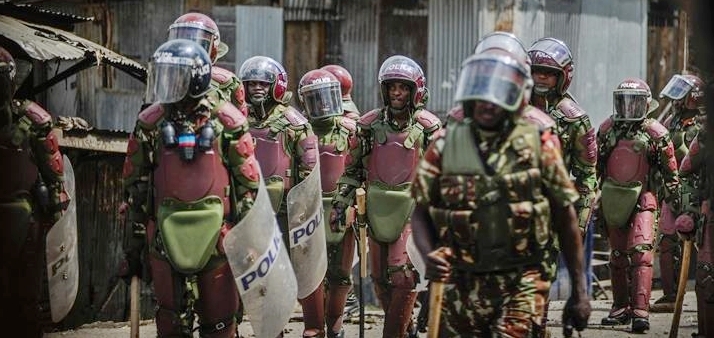 Kenyan police at June 2023
demonstration in Kenya against tax hikes.
Kenyan police at June 2023
demonstration in Kenya against tax hikes.
The Kenya police force was established as a British colonial police force in 1907. Prior to this, from 1887 to 1902, policing was provided by the East Africa Trading Company. After 1902 the Kenya-Uganda Railway introduced their own police units.
In 1906 the Police Ordinance was established to create a new force, the Nairobi Mounted Police within the jurisdiction of the East Africa Protectorate. This changed its name in 1920 when the British Kenya Colony was created. In this regard, its origins and aim parallel that of the Royal Canadian Mounted Police in 1920, also a creation of the British which established its predecessors, the Royal North-West Mounted Police and the Dominion Police.
The colonial Kenya police force was made up mainly of British and Indian recruits as senior officers and Africans amongst lower ranks. Following Kenya's independence in 1963, the British officers were replaced with local Kenyan members. This followed the rebellion against the brutal British rule by the Kikuyu and other tribes in Kenya. As a result of the growing discontent, during the 1950s there was a sustained rebellion against colonial rule. The British claimed the rebels were part of a secret and savage society known as the "Mau Mau," whose members had supposedly pledged to slaughter Europeans and drive them out of Africa.
The British war against the Kikuyu, who represented the largest group in the rebellion, was ruthless and justified by charges that the rebels were terrorists. The British created detention camps for people suspected of being associated with the Mau Mau, including the elderly and children, and used methods of extreme torture to find information and to limit uprisings. Over 1 million Kenyans were forcibly removed from their homes and detained in the camps.
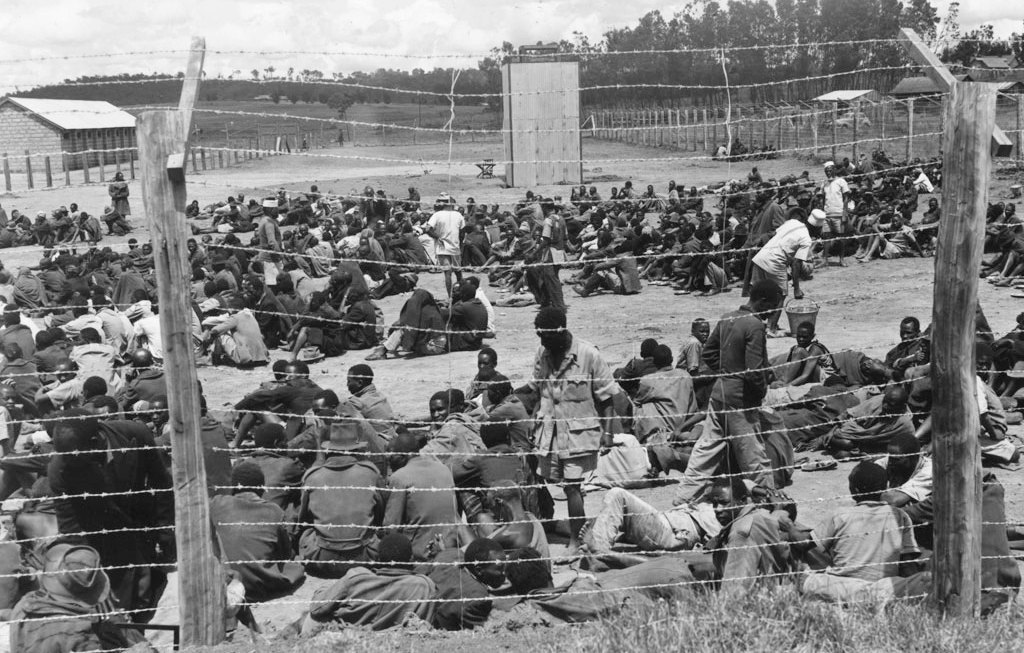
One of the detention
camps for those the British suspected as being members of the "Mau Mau"
A cache of British government documents came to light almost half a century after it was spirited out of the country on the eve of independence. The Guardian newspaper wrote:
"The papers disclose the depths to which the British authorities sank during the 1950s rebellion, and prove that ministers in London were briefed fully about the abuses that were being inflicted upon prisoners at camps across the colony.
"In a test case before the UK courts, a group of former Mau Mau detainees are suing the British government. Among them are two men who were castrated while being tortured. The men were part of an extraordinarily violent uprising against British rule triggered by the loss of farming land to European settlers.
"While the Foreign Office is not denying the allegations, it is deploying a range of constitutional precedents to reject the claims, arguing that legal responsibility was transferred to the Kenyan republic on independence in 1963.
"The high court in London heard that the latest cache of documents had been removed from Kenya as part of a policy of removing sensitive or incriminating files from former colonies, and were later stored at a Foreign Office depository in Buckinghamshire. They were finally disclosed earlier this year.
"They show that in June 1957 Alan Lennox-Boyd, secretary of state for the colonies, received a secret memorandum written by Eric Griffiths-Jones, the attorney general of Kenya, which detailed changes to the abuse of Mau Mau detainees, who were being subjected to extreme violence immediately upon admission to detention camps.
"Blows were aimed mostly upper body, Griffiths-Jones wrote, adding that 'vulnerable parts of the body should not be struck, particularly the spleen, liver or kidneys.' Those who protested would have 'a foot placed on his throat and mud stuffed in his mouth ... in the last resort knocked unconscious.'
"Griffiths-Jones drafted changes to the colony's laws to permit such abuses. While expressing no concern for the legal or human rights of the detainees, his memorandum did express concern for those carrying out the attacks: 'The psychological effects on those who administer violence are potentially dangerous; it is essential that they should remain collected, balanced and dispassionate.'
"Griffiths-Jones' memo was written for the governor of Kenya, Sir Evelyn Baring, who passed it on to Lennox-Boyd with a covering letter which asserted that inflicting 'violent shock' was the only way of dealing with Mau Mau insurgents. Despite this, the Foreign Office is arguing that it is not legally liable as Lennox-Boyd was acting as Kenyan secretary of state at the time.
"The documents also show that Colonel Arthur Young, a veteran police officer and Christian socialist who lasted less than a year as commissioner of the Kenyan police before resigning, told Baring in December 1954 that the camps 'present a state of affairs so deplorable that they should be investigated without delay so that the ever-increasing allegations of inhumanity and disregard for the rights of the African citizen are dealt with.'
"The following month Baring informed Lennox-Boyd that eight European officers were facing accusations of a series of murders, beatings and shootings. They included: 'One District Officer, murder by beating up and roasting alive of one African.'
"Despite receiving such clear briefings, Lennox-Boyd repeatedly denied that the abuses were happening, and publicly denounced those colonial officials who came forward to complain.
"The documents also contain descriptions of torture that the colonial officials themselves were providing to their superiors. An African employee of Special Branch "pushed pins into their sides, buttocks, fingers and, on at least one occasion, the head, and ... pinched the sides of their bodies, penis and scrotum with pliers. He crushed the fingers of one detainee."
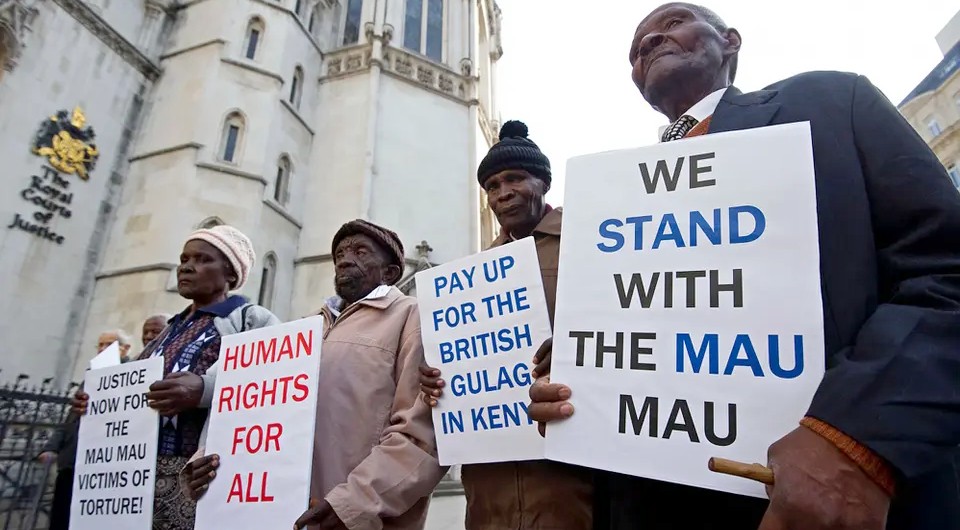 Test case claimants in case against
the British government (left-right), Jane Muthoni Mara, Paulo
Nzili, Ndiku Mutua and Wambugu wa Nyingi outside the High
Court in central London, on April 7, 2011.
Test case claimants in case against
the British government (left-right), Jane Muthoni Mara, Paulo
Nzili, Ndiku Mutua and Wambugu wa Nyingi outside the High
Court in central London, on April 7, 2011.
"Four of the test case claimants, Ndiku Mutua, Paulo Nzili, Wambugu wa Nyingi and Jane Muthoni Mara, who are in their 70s and 80s, have flown 4,000 miles from their rural homes for the hearing.
"Last week (April, 2011) the judge, Mr Justice McCombe, heard Mutua and Nzili had been castrated, Nyingi spent two years in manacles before being beaten unconscious during an incident at a British detention centre in which 11 other men were clubbed to death, and Mara had been subjected to severe sexual violence."
This is just a very brief recounting of the history of the Kenya police, created by the British who went to Kenya because of its resources as they scrambled for Africa in the 19th century with other colonial powers. The British forced Indigenous farmers and herders onto infertile land or made them work on European-owned farms and plantations. They created unprecedented ethnic conflict between various groups in their divide and conquer campaign and then created police forces to protect their interests.
British rule in Kenya was characterized by brutal working conditions, state-organized racism, brutal labour practices, forced resettlement and brutal criminalization and treatment, all based on protecting British interests and the authority of British rule.
Kenya's
Military
With
the Canadian government continuing to play a nefarious role in the
international intrigues against the Haitian people and the peoples of
the Caribbean, the holding of the Canada-CARICOM Summit in Ottawa is
sure to be used to further the aim of the U.S. administration to
undermine the struggles of the peoples of the Caribbean. It will
continue to push the imperialist narrative about "democracy,"
"rules-based international order," security and human rights as a cover
for the opposite, the strengthening of foreign political, economic and,
in the case of Haiti, military/police dictate.
Given
this
situation and the role that the Kenyan police are now being brought in
to play, it is also instructive to look at the Kenya Defence Forces
(KDF) and the role Kenya's military plays on behalf of the major
powers. The website of the KDF says its participation in what it calls
peace operations "also exposes the KDF to strategic partnerships with
militaries from developed countries which assist in building structural
capacities in the ever-evolving modern warfare (including asymmetric
warfare currently employed by terrorist groups) as well as opening
avenues of access to training facilities and the latest hardware
through grants."
The KDF notes in particular, the
International
Peace Support Training Centre in Nairobi, Kenya funded by Canada,
Britain and the Netherlands "as an example of strategic partnerships
with developed countries." It adds as well: "Kenya's bilateral
agreements with the U.S. have in the past covered inter alia support to
UN-authorized peace keeping operations as well as funding for major new
arms deliveries and increased military training."
(Wikepedia; "Secret memo gave guidelines on abuse of Mau Mau in 1950s, The Guardian, April 11, 2011.)
(To access articles individually click on the black headline.)
Website: www.cpcml.ca Email: editor@cpcml.ca

